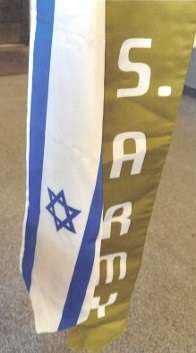The Volokh Conspiracy
Mostly law professors | Sometimes contrarian | Often libertarian | Always independent
No First Amendment Right to Wear Graduation Stole Displaying Star of David, Israeli Flag, U.S. Army Insignia

From Judge Kathryn Kimball Mizelle in Thursday's Bar-Levy v. Cruze:
Yaakov Bar-Levy, a senior at West Port High School, moves for a temporary restraining order and preliminary injunction allowing him to wear a stole displaying the Star of David, the Israeli flag, and a U.S. Army insignia at his graduation ceremony on May 31, 2025. By denying him permission to don that garment at the school's event, Bar-Levy alleges that school officials will violate the First and Fourteenth Amendments and that the World Equestrian Center, the site of the graduation, will violate the Civil Rights of Act of 1964.
The Supreme Court has long held that schools may not ordinarily censor speech based on viewpoint. Had the evidence demonstrated viewpoint discrimination or selective enforcement, the equities otherwise favor a preliminary injunction. But Bar-Levy fails to present evidence that the school discriminates based on religion or viewpoint in prohibiting any non-academically earned stoles and honor cords, so he has not shown a substantial likelihood of success on the merits. I therefore deny his motion.
The court concluded that, because the graduation ceremony was "school-sponsored speech" (much like a school "theatrical production"): "Among other things, the school communicates its message celebrating academic achievement by prescribing the academic regalia worn at the ceremony and providing attendees with a bulletin explaining each adornment's meaning." The restriction on insignia, the court held, "will withstand constitutional scrutiny if it is "reasonably related to legitimate pedagogical concerns." And it held that "[o]n the current record, both requirements are met":
First, the school's policy—which allows for the donning of only pre-approved academic stoles—is reasonably related to the legitimate pedagogical goal of celebrating academic achievement. See, e.g., Griffith, 157 F. Supp. 3d at 1164 (explaining that the policy at issue "allows the school to reserve special recognition for student achievement or participation in school-related activities"); Dreaming Bear, 714 F. Supp. 2d at 990 (explaining that the policy at issue "furthers the school board's interest in demonstrating the unity of the class and celebrating academic achievement"). The policy also allows the school to avoid endorsing specific policy or religious positions. See, e.g., Griffith, 157 F. Supp. 3d at 1164 (collecting cases recognizing this interest).
Second, there is not enough evidence in the record to conclude that the government defendants are engaged in viewpoint discrimination. At the hearing, Bar-Levy's counsel suggested that, for this inquiry, I should consider the school district's policy—which delegates discretion to each principal—rather than West Port's policy that liquidates Cruze's exercise of discretion. Either way, Bar-Levy's evidence is insufficient. As for West Port, the school codified on its website its longstanding, viewpoint-neutral policy allowing for the wearing of only academic stoles. Although Bar-Levy alleges that "[s]imilar forms of graduation expression—such as leis, cords, and cultural symbols—have routinely been permitted or overlooked in past [West Port] High School ceremonies," Bar-Levy walked this allegation back during the evidentiary hearing, testifying that he was unaware of any exemption. Bar-Levy's father was similarly unable to identify such an exemption at West Port. Indeed, Bar-Levy's counsel could not point to any such evidence either.
As for district-wide evidence, Bar-Levy's counsel relied on vague testimony from Bar-Levy's father that suggested he witnessed deviations at other schools' graduation ceremonies. Bar-Levy's father did not identify what those instances included, how many, or any other specific details. Given Bar-Levy's burden, this testimony is far from enough to establish that the school district's policy is applied in a viewpoint-based manner. Therefore, no matter which policy is examined— whether West Port's or the district's—Bar-Levy has not established a substantial likelihood of success on the merits.
Under precedent, Bar-Levy's planned expression of wearing a stole at graduation would be school-sponsored speech. Because the challenged policy [is] "reasonably related to legitimate pedagogical concerns" and viewpoint neutral, Bar-Levy has not shown a substantial likelihood of success on the merits.
And the court held that the policy didn't violate the Free Exercise Clause, either, applying Employment Division v. Smith (1990), which held that the Clause doesn't provide a right to religious exemptions from generally applicable, religion-neutral rules. The court closes:
Bar-Levy's desire to celebrate his faith and military service to our Country is admirable. But based on precedent and the absence of evidence of viewpoint or religious discrimination, Bar-Levy has failed to demonstrate a substantial likelihood of success on the merits of his claims.
Christopher Allan Anderson (Gilligan, Gooding, Franjola Batsel, P.A.) and Jeremy Tate Powers represent defendants.


Show Comments (11)